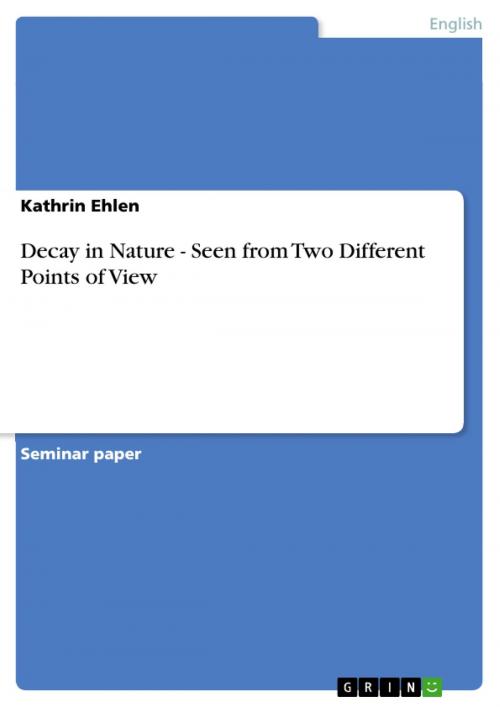Decay in Nature - Seen from Two Different Points of View
Nonfiction, Entertainment, Drama, Anthologies| Author: | Kathrin Ehlen | ISBN: | 9783640942442 |
| Publisher: | GRIN Verlag | Publication: | June 22, 2011 |
| Imprint: | GRIN Verlag | Language: | English |
| Author: | Kathrin Ehlen |
| ISBN: | 9783640942442 |
| Publisher: | GRIN Verlag |
| Publication: | June 22, 2011 |
| Imprint: | GRIN Verlag |
| Language: | English |
Seminar paper from the year 2006 in the subject American Studies - Literature, grade: 1,7, University of Paderborn (Anglistik und Amerikanistik), course: American Poetry from the Puritans to the Revolution, language: English, abstract: Decay in nature can be seen from different points of view. On the one hand, to decay just means to die or more literally to rot. This is not a pleasant process, but a process that cannot be stopped and must take place according to the natural way of life/the laws of nature. On the other hand, decay does not only have this negative connotation because to decay in nature also means that something new is developing out of the dead material. Only when something, like an apple for example, dies, a new generation of apples can arise. These two different points of view are shown in the poems ''Tis the Last Rose of Summer' by Thomas Moore (1779-1852) and 'On Observing a Large Red-streak Apple' by Philip Freneau (1752-1832).
Seminar paper from the year 2006 in the subject American Studies - Literature, grade: 1,7, University of Paderborn (Anglistik und Amerikanistik), course: American Poetry from the Puritans to the Revolution, language: English, abstract: Decay in nature can be seen from different points of view. On the one hand, to decay just means to die or more literally to rot. This is not a pleasant process, but a process that cannot be stopped and must take place according to the natural way of life/the laws of nature. On the other hand, decay does not only have this negative connotation because to decay in nature also means that something new is developing out of the dead material. Only when something, like an apple for example, dies, a new generation of apples can arise. These two different points of view are shown in the poems ''Tis the Last Rose of Summer' by Thomas Moore (1779-1852) and 'On Observing a Large Red-streak Apple' by Philip Freneau (1752-1832).















